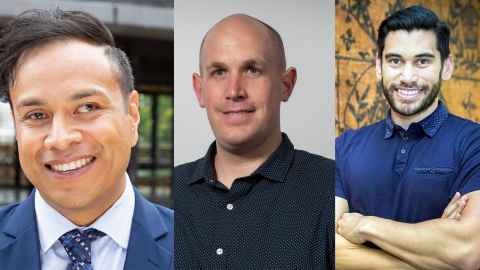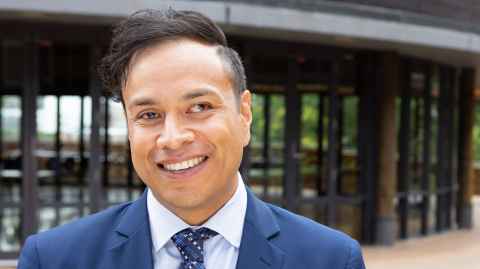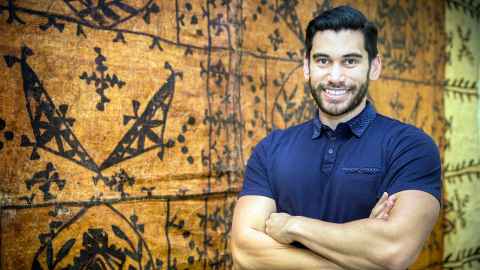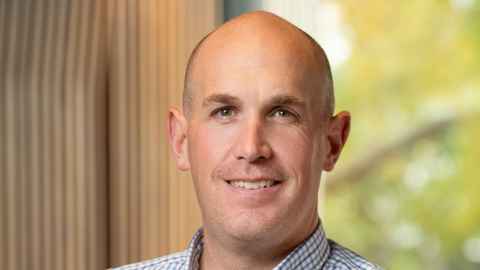Emerging Māori and Pacific health researchers receive funding boost
22 May 2024
The Health Research Council has awarded three University of Auckland researchers Māori and Pacific Emerging Leader fellowships.

The Health Research Council of New Zealand (HRC) has announced more than $5.6 million in funding to help support nine up-and-coming Māori and Pacific health researchers to become leaders in their field.
The 2024 Māori and Pacific Health Research Emerging Leader Fellowships are valued at up to $650,000 each and include three recipients from Waipapa Taumata Rau, University of Auckland.
The two Pacific recipients are Seuta‘afili Dr Patrick Thomsen (Faculty of Arts) and Dr Sam Manuela (Faculty of Science). Dr Thomsen receives $645,799 over 48 months for his research ‘Manalagi: Addressing discrimination in healthcare for Pacific Rainbow+’.
Dr Manuela receives $551,786 over 48 months for his research into ‘Enhancing Cook Islands mental health practices, knowledge, and research’.
Māori emerging research leader Dr Kimiora Henare (Ngāti Haua, Te Rarawa, Te Aupōuri) receives $649,412 over 48 months. His research is focused on addressing a potential workforce challenge related to the delivery of precision oncology, where doctors and patients choose treatments based on the DNA signature of an individual patient’s tumour.
HRC chief executive, Professor Sunny Collings, says the emerging leader fellowships have enormous potential to advance Māori and Pacific health through innovative and impactful research.
“People-focused funding opportunities help build and shape a highly skilled, diverse, and responsive research workforce,” she says.

About the University of Auckland recipients
Dr Seuta‘afili Patrick Thomsen
Dr Thomsen says his interest in health research is related to his own lived experience as a Samoan kid growing up within a low-income family in South Auckland.
“As a young person … I remember my cohort routinely being the target of many a health intervention. Whether it was numerous immunisation campaigns, sexual health education or the fight against rheumatic fever, for me, there was a sense that I was living in a community that was always in the spotlight.
“This spotlight wasn’t the rockstar type of lighting. It was as if my communities – Pacific, South Auckland, and, as I grew, Rainbow+ – were constantly being problematised in not only the health space, but in many socio-economic areas. We were being treated for brokenness in deficit ways, dominating the way we were seen and ultimately presented and positioned within New Zealand society.”
As he learned about the challenges his communities were encountering with the New Zealand healthcare system, Dr Thomsen says he became convinced of the power of data to shift policy settings. After completing his PhD at the University of Washington in Seattle, he moved into researching Pacific Rainbow+ health and well-being after discovering that there was next to no data in this area.
In 2020, Dr Thomsen received a HRC Pacific Health Emerging Researcher First Grant to carry out the Manalagi Project, which is designed to create a safe cultural research space for Pacific Rainbow+ communities to communicate their unique health and well-being needs.
“We’re determined to move beyond polarising positions. Instead, we will continue the Manalagi ethos, which states that while it is easy for people to focus on how Pacific Rainbow+ individuals ‘stick out’, it’s important to remind everyone of the ways that we fit in – fit into and contribute to our families, workplaces, cultures, churches, schools and societies.
“I’m motivated to have our communities’ experiences be taken seriously within the framework of research, but more than that, validating Pacific ways of generating knowledge as a valuable tool to advance changes in health policy and delivery that can help improve the outcomes for many of us who sit in the margins of society.”

I’d love to see a Pacific regional mental health research programme that addresses the unique needs of each nation in the Pacific.
Dr Sam Manuela
Dr Manuela started as a lecturer in the School of Psychology in 2017, and says he hopes one day to become a professor.
His early research focused on Pacific identities and well-being in Aotearoa, where he developed the Pacific Identity and Well-being Scale to provide researchers with a way to provide quantitative data about the lives of our Pacific communities.
This work opened many other opportunities, including an HRC Pacific Emerging Researcher First Grant to conduct a survey of mental health in the Cook Islands, and Royal Society Te Apārangi funding to investigate how Pacific psychologists use their cultural knowledge and practices within their various fields in psychology.
Dr Manuela says he is inspired by the Pacific academics in psychology that came before him – including Associate Professor Mele Taumoepeau, Professor Julia Ioane, and Professor Siautu Alefaio-Tugia – each of whom serves as a role model. He says his family in New Zealand and the Cook Islands have also been extremely supportive.
Dr Manuela’s emerging leader fellowship will build on his previous HRC research, focusing on the voices of Cook Island youth and their thoughts on mental health, investigating the validity of existing mental health measures used with Cook Islands populations, and conducting another large-scale survey to document any changes in the mental health experiences of the population.
“I hope this information provides more avenues for how our communities can support each other’s mental health. I envision conversations and actions around reducing the stigma that can be attached to mental health issues, so our communities can support each other in meaningful ways.
“I’d love to see a Pacific regional mental health research programme that addresses the unique needs of each nation in the Pacific and provides a pathway for building a well-supported and well-resourced mental health service team tailored to each population. I also hope to see this research reflected in our curriculum so that all people who wish to have a career in psychology or mental health are well-informed on Pacific mental health issues.”

Dr Kimiora Hēnare
Dr Hēnare says his parents inspired him to pursue higher learning and research. He fondly remembers many discussions over the years with his dad, the late Dr Mānuka Hēnare, an associate professor in Māori business development and expert on He Whakaputanga and Te Tiriti o Waitangi, about genetics, genetic engineering, research, and Te Tiriti. A health focus was encouraged by his mum, Diane, a giant in occupational therapy, in both service delivery and training.
Since high school, Dr Hēnare says he has liked the idea of coming up with new treatments to treat disease and help people. This motivation was reinforced during his biomedical science degree where he learned about the biological basis of disease and how the body responds to those challenges, with cancer grabbing his attention the most. His academic journey continued with a Master of Health Science in cancer research followed by a PhD, funded by a HRC scholarship, and the prestigious HRC Eru Pomare Postdoctoral Fellowship.
“Since my postdoctoral fellowship, I’ve had the privilege of learning from the best about Māori health research and cancer genomics at the University of Auckland. Part of growing up for me as a Māori biomedical scientist was recognising my place in a complex research ecosystem and reflecting on how I could apply my intersecting skills to make a difference for whānau with cancer, much sooner than the pathway of a single new medicine from discovery in a lab to approval and delivery in the clinic.”
For his emerging leader fellowship, Dr Hēnare is focused on addressing a potential workforce challenge related to the delivery of precision oncology, which is where doctors and patients choose treatments based on the DNA signature of an individual patient’s tumour.
“Others are working hard to address the infrastructure demands of precision oncology. My research seeks to understand the workforce capacity and capabilities needed to deliver it equitably – starting with Māori – and establish a roadmap for growing the expertise needed.”
For media enquiries
Te Rina Triponel
Kaitohutohu Pāpāho Māori, Māori Media Adviser
Mob: 021 029 90650
E: te.rina.triponel@auckland.ac.nz
Kim Meredith
Pacific Media Adviser
Mob: 027 435 7591
E: kim.meredith@auckland.ac.nz